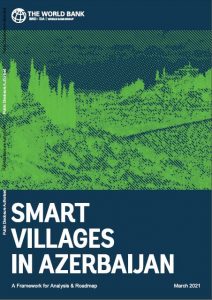Smart Villages in Azerbaijan – A Framework for Analysis and Roadmap

This paper is the main output of an analytical and research program aimed at identifying policy options to develop technology and social innovation driven smart village approaches that can improve service delivery and local economic development in rural areas. The concept of smart villages focuses on enabling communities – in partnership with local government and the private sector – to identify opportunities and solutions that are right for their own areas based on demand (bottom-up and participatory needs assessment), on transferring knowledge and innovation, and on policy incentives.
With these three elements in place, customized smart solutions for rural areas can result in greater local economic development with better connectivity and improved services, increased livelihoods and incomes, and improved quality of life. The paper is presented in six sections, each representing an element of the research and analysis undertaken to define and apply the concept of smart villages in Azerbaijan.
The first section presents the context of rural development, particularly aspects which relate to the rural-urban divide, public policies, and programs aimed at advancing rural development, as well as the digital dimensions of development. The second section introduces the concept of smart villages. What does this mean? How do other countries apply this term? What are the core principles and elements? Following from the definition and global examples of smart villages, the paper lays out a framework for assessing the smart village readiness of villages in Azerbaijan, viewing them as spatial clusters and drawing on global big data and national data sources to rank village clusters with common spatial characteristics as the most versus the least ready to apply smart village approaches.




